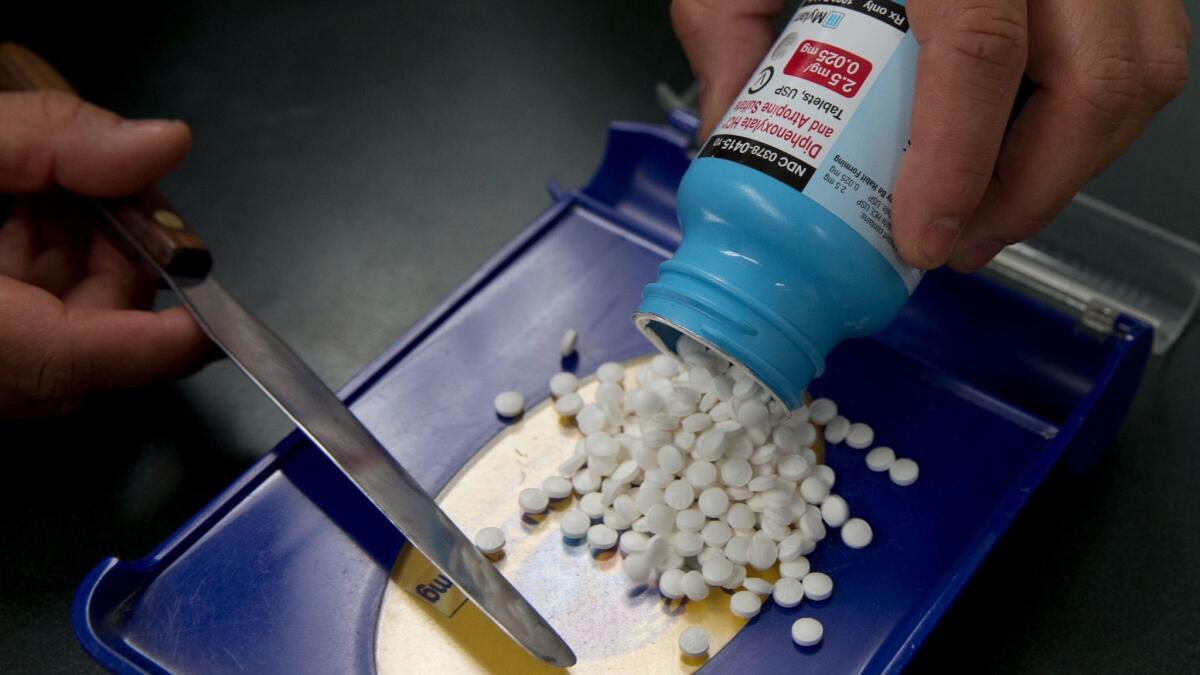Californians will get more information on what’s driving prescription drug prices under law signed by governor

- Share via
Reporting from Sacramento — Gov. Jerry Brown approved a measure Monday to increase disclosure on prescription drug prices, the focal point of growing efforts to clamp down on climbing pharmaceutical costs.
Supporters call the law the nation’s most sweeping effort to make prescription drug pricing more transparent. The measure would require drugmakers to provide notice to health plans and other purchasers 60 days in advance of a planned price hike if the increase exceeds certain thresholds.
The measure, SB 17 by state Sen. Ed Hernandez (D-Azusa), will also require health plans to submit an annual report to the state that details the most frequently prescribed drugs, those that are most expensive and those that have been subject to the greatest year-to-year price increase.
”The essence of this bill is pretty simple,” Brown said at a Capitol signing ceremony. “Californians have a right to know why their medical costs are out of control, especially when pharmaceutical profits are soaring.”
The disclosure, backers say, would help shed light on how prescription drugs are contributing to overall healthcare costs.
“SB 17 speaks to the needs of all Californians who have felt the strain of nonstop prescription drug price increases,” Charles Bacchi, president and chief executive of the California Assn. of Health Plans, said in a statement. “Pharmaceutical prices have long played an outsized role in driving up the cost of health coverage across the board. SB 17 gives us the tools to address the issue by helping us prepare for price hikes and discouraging needless cost increases.”
But pharmaceutical companies strongly opposed the measure, arguing the information would paint an inaccurate picture of drug spending, since the disclosure centers on full sticker cost set by manufacturers. Purchasers rarely pay the full list price, either through negotiated discounts or through use of consumer rebates or coupons.
“It is disappointing that Gov. Brown has decided to sign a bill that is based on misleading rhetoric instead of what’s in the best interest of patients,” Priscilla VanderVeer, a spokeswoman for the Pharmaceutical Research and Manufacturers of America, said in a statement. She said the measure “ignores the reality that spending on prescription medicines remains a much smaller portion of overall healthcare spending.”
VanderVeer said the manufacturers’ group was ready to work to combat affordability issues but added: “It’s time to move beyond creating new, costly bureaucratic programs that don’t make a dent in patients’ costs for medicines.”
Escalating drug prices inspired a slate of measures from lawmakers this year. Brown on Monday signed an additional measure, AB 265 by Assemblyman Jim Wood (D-Healdsburg), that will restrict the use of drug rebates or coupons for brand-name drugs when cheaper generic alternatives are available.
The law includes a number of exemptions, including for when patients have gotten authorization from their health insurers for brand-name treatments. But Wood has pitched his measure as a way to stem widespread use of such vouchers, which some researchers have said drive higher overall healthcare costs by giving patients incentive to pick pricier medicines.
Other related bills, including a measure to clamp down on gifts doctors can receive from pharmaceutical companies and a proposal to regulate pharmacy benefit managers, a little-scrutinized part of the drug supply chain, sputtered earlier this year.
The disclosure bill was seen as the centerpiece of the focus on drug prices, setting off a fierce lobbying battle in which the pharmaceutical industry squared off against a coalition of backers that included health plans, labor groups and consumer advocates.
It also garnered support from some Republican lawmakers, who have typically been aligned with drug makers.
“Shouldn’t we do something to help make this system operate better so we can get better cost savings for our consumers? That’s a conservative principle,” said Assemblyman James Gallagher (R-Yuba City).
Now, Hernandez said, he hoped the law would inspire similar action on a national level.
“I want to challenge our federal elected officials...to do the same thing at the national level,” he said, “so that we can make sure that every single person in this country not only has access to healthcare but they can afford their healthcare premium dollars.”
In his signing remarks, Brown said the angst over rising drug costs — and manufacturers’ substantial profits — was symptomatic of the broader gap between the haves and have-nots.
“The social and political fabric is being ripped apart,” Brown said. “The inequities are growing. The rich are getting richer, the powerful are getting more powerful and a growing number of people are getting more desperate, more alienated.”
He directed a message to the pharmaceutical industry that opposed the bill: “You’ve got to join with us. You’re part of America. And if we all don’t pull together, we’re going to pull apart.”
Follow @melmason on Twitter for the latest on California politics.
ALSO
Bill to shed more light on prescription drug prices heads to Gov. Jerry Brown’s desk
UPDATES:
5:19 p.m.: This article was updated to add information about a second drug pricing bill signed by Gov. Jerry Brown and a comment from Assemblyman James Gallagher (R-Yuba City).
1:30 p.m.: This article has been updated with comments from Brown and Hernandez.
This article was originally published at 10 a.m.
More to Read
Get the L.A. Times Politics newsletter
Deeply reported insights into legislation, politics and policy from Sacramento, Washington and beyond. In your inbox three times per week.
You may occasionally receive promotional content from the Los Angeles Times.











